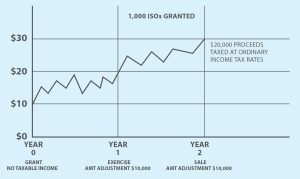Nelson Capital Management


Today, many companies issue stock options to their employees because this ties employee compensation to the success of the company. There are two basic types of options: Incentive Stock Options (ISOs) and Nonqualified Stock Options (NSOs). While both types of options benefit the employee as the company valuation rises, there are significant differences in taxation.

The main advantage of an ISO is favorable tax treatment; however, there are holding period requirements which must be met. An employee must sell the stock at least two years from the date of grant and one year from the date of exercise in order to have long-term capital treatment on the appreciation. Furthermore, there are Alternative Minimum Tax adjustments at date of exercise and date of sale.
For example, let’s say 1,000 ISOs are granted with an exercise price of $10. As long as this is higher than the fair market value of the stock, there will be no taxable income at the date of grant. The employee waits one year to exercise the ISOs while the stock is at $20 resulting in an AMT adjustment of $10,000. One year from the date of exercise, the employee can sell those shares at $30 a share and will receive $20,000 taxed at long-term capital gain tax rates and a negative AMT adjustment of $10,000.
 If the holding period requirements are not met, the sale is known as a disqualifying disposition and any appreciation is taxed at ordinary income tax rates and the AMT adjustment is reversed.
If the holding period requirements are not met, the sale is known as a disqualifying disposition and any appreciation is taxed at ordinary income tax rates and the AMT adjustment is reversed.
This is essentially how a Nonqualified Stock Option functions. There is no holding period requirement thus all appreciation is taxed at ordinary income tax rates and there are no AMT adjustments.
While the preferential tax treatment of ISOs is attractive, there are many factors to consider such as cash required up front to purchase the options, the AMT adjustment potentially resulting in higher taxes in one year and uncertainty of the stock price after the holding period requirement.
Individual investment positions detailed in this post should not be construed as a recommendation to purchase or sell the security. Past performance is not necessarily a guide to future performance. There are risks involved in investing, including possible loss of principal. This information is provided for informational purposes only and does not constitute a recommendation for any investment strategy, security or product described herein. Employees and/or owners of Nelson Capital Management, LLC may have a position securities mentioned in this post. Please contact us for a complete list of portfolio holdings. For additional information please contact us at 650-322-4000.
Receive our next post in your inbox.